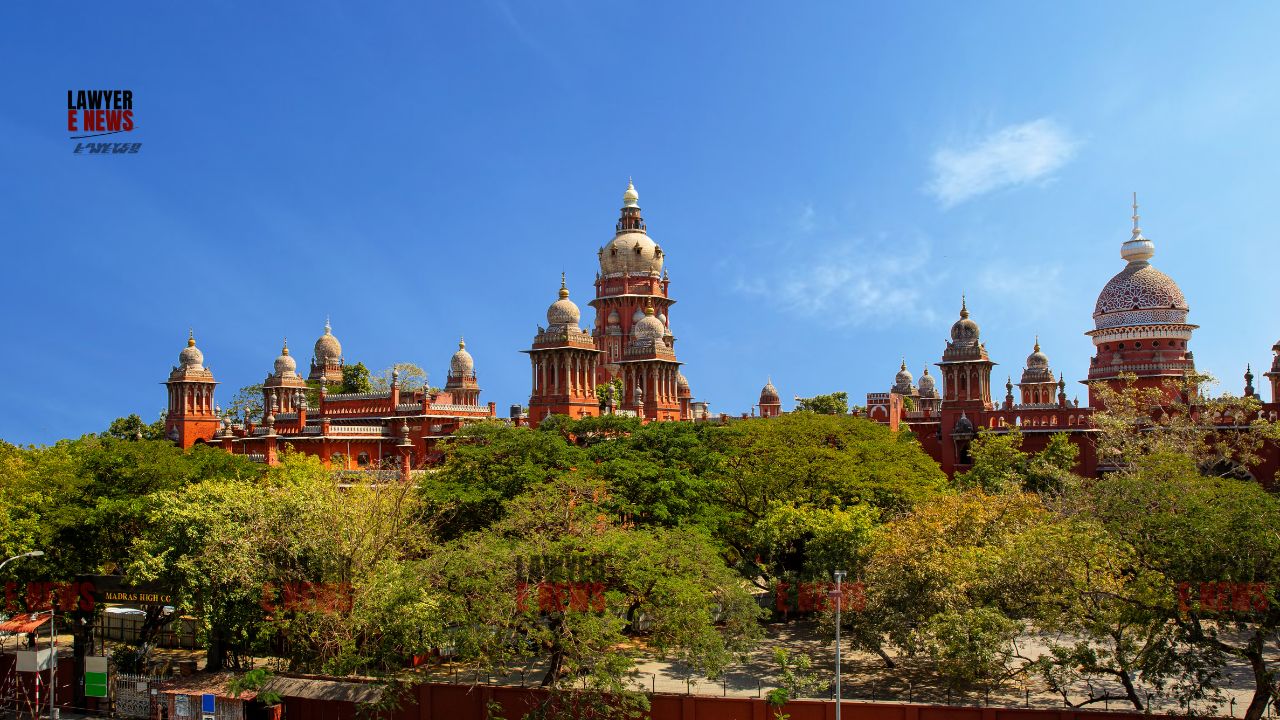-
by Admin
15 February 2026 5:01 PM



Madras High Court, comprising Hon'ble Justice J. Nisha Banu and Hon'ble Justice R. Sakthivel upholding a compensation award of ₹42,03,960 to the family of Boopathy, who died in a road accident. The appeal was filed by the United India Insurance Company Limited, challenging the award passed by the Motor Accident Claims Tribunal, Hosur, in M.C.O.P. No. 55 of 2018. The court confirmed the insurer's liability to pay the compensation amount while granting it recovery rights against the negligent motorcyclist, the first respondent, without requiring a separate suit.
The deceased, Boopathy, was traveling as a pillion rider on November 17, 2014, on a motorcycle driven by the first respondent, Magesh. The accident occurred when Magesh rashly overtook a lorry and abruptly slowed down, leading to a collision with the lorry from behind. Boopathy sustained fatal injuries and died on the spot. Initially, an FIR was lodged blaming an unidentified lorry for the accident.
The deceased’s wife, Priya (first respondent), along with their two minor daughters and Boopathy’s parents, filed a claim under Section 166 of the Motor Vehicles Act, 1988, seeking ₹75,00,000 as compensation. The Tribunal awarded ₹42,03,960 with 7.5% interest, holding the first respondent (motorcycle rider) negligent. The Tribunal directed the insurer (United India Insurance) to pay the compensation and granted it liberty to recover the amount from the tort-feasor.
Aggrieved by the Tribunal’s findings, the insurer filed an appeal before the Madras High Court, contesting both negligence and liability.
Determination of Liability: Whether the accident occurred due to the negligence of the first respondent (motorcyclist) or an unidentified lorry, as per the insurer's claim.
Quantum of Compensation: Whether the compensation amount awarded by the Tribunal was appropriate.
Insurer's Right of Recovery: Whether the insurer was entitled to recover the compensation paid to the claimants from the tort-feasor.
The court noted that the first respondent, Magesh, who rode the motorcycle, failed to contest the case or depose before the Tribunal. His absence left the claimants’ evidence unchallenged. The petitioners produced eyewitness testimony (P.W.2) and the FIR to establish negligence. P.W.2 testified that the accident occurred because the first respondent rashly swerved to overtake a lorry. The court held that despite inconsistencies in P.W.2’s cross-examination, his testimony largely corroborated the claimants' case.
The first respondent’s failure to cooperate with the insurer or produce necessary documents, such as his driving license, further weakened his defense. The court held the first respondent solely responsible for the accident.
As the first respondent's motorcycle was insured under a valid policy (Exhibit P.3), the court affirmed that the insurer was liable to compensate the claimants. However, citing the first respondent’s negligence and breach of policy terms (failure to cooperate with the insurer), the court granted the insurer the right to recover the compensation from the first respondent through execution proceedings, without the need for a separate suit.
The Tribunal had fixed the deceased’s annual income at ₹2,42,200 based on his income tax returns (Exhibit P.9). Although the Tribunal erroneously relied on the post-mortem report to determine the deceased's age (35 years) instead of transfer certificates, which showed his age as 29 years, the court declined to modify the award. Since the claimants had not challenged the quantum, the court upheld the compensation of ₹42,03,960.
The court disagreed with the Tribunal's finding that the claimants could proceed against either the lorry or the motorcyclist. It clarified that the first respondent (motorcyclist) was the sole tort-feasor, and this was not a case of composite negligence.
The Madras High Court partly allowed the appeal, confirming the Tribunal’s award but modifying the recovery procedure. The key directives were as follows:
The insurer (United India Insurance Company) must deposit the compensation amount of ₹42,03,960, with interest at 7.5% per annum from the date of petition filing, within 45 days.
The insurer is entitled to recover the compensation amount from the first respondent (motorcyclist) by filing an execution petition, eliminating the need for a separate suit.
The apportionment of the compensation among the claimants remains unchanged.
The judgment underscores the court’s commitment to protecting the rights of accident victims while ensuring procedural fairness for insurers. By affirming the insurer’s liability with recovery rights, the court struck a balance between the social welfare objectives of the Motor Vehicles Act and the contractual obligations under insurance policies. This decision reiterates that insurers are duty-bound to compensate victims but are entitled to recover amounts from negligent tort-feasors who breach policy terms.
Date of Decision : December 9, 2024
